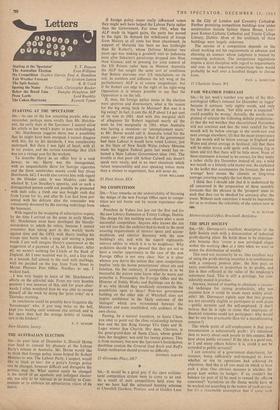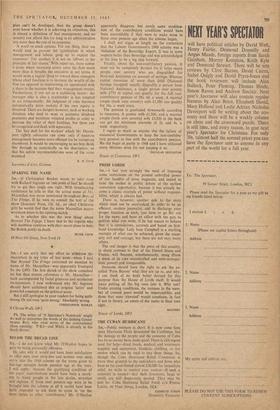THE SPLIT SOCIETY
SIR,—Mr. Davenport's excellent description of the Split Society ends with a denunciation of industrial profit-sharing plans. He holds them to be objection- able because they 'create a new privileged clique within the working doss at a time when we want to widen the distribution of wealth.'
This need not necessarily be so. One excellent way of using the profit-sharing incentive is in combination with a company pension plan : the firm pays an extra contribution in proportion to its profits, and this is then reflected in the value of the employee's retirement fund. This is still a privilege, but con- siderably muted in practice.
Anyway, instead of wanting to eliminate a success- ful technique for raising productivity, why not examine how it could be made more widely avail- able? Mr. Davenport rightly says that two groups are not currently eligible to participate in such plans —public servants and the self-employed. (I don't believe that he is right to claim that employees of financial concerns could not participate : why would that be any less practicable than for a manufacturing concern?)
The whole point of self-employment is that your remuneration is substantially profit: it's ridiculous then to worry about such people in this context. But how about public servants? If the idea is a good one, as I and many others believe it is, could it not be extended to public servants?
• I can conceive of a government department, for instance, being sufficiently well-managed to know whether or not its operations had achieved its objectives. And this is all you need on which to base such a plan. One obvious measure is whether the group kept within its budget : if so, couldn't the balance (or part of it) be used to reward the officers concerned? Variations on the theme would have to be worked out according to the nature of each service, but it's a reasonable assumption that if some such
plan can't be developed, then the group doesn't even know whether it is achieving its objectives; this is almost a definition of bad management, and no country can afford this for long in its administration any more than the rest of its economy.
A word on stock options. For one thing, their use would tend to prevent the 'syndicalism in which management and labour gang up to exploit the consumer.' For another, it is not an 'affront to the principle of fair shares.' With super-tax, there comes a point where increased salary costs the firm much more than it benefits the executive in net terms. It would seem a logical thing to reward those managers whose chief function is to increase the wealth of the firm (as opposed to maintaining its operations) with a share in the increase that their management creates. Furthermore, it can act .as a stabilising factor : the manager who is also a stockholder is less tempted to act irresponsibly: his judgment of risks becomes automatically more realistic if his own equity is involved. There are dangers however, such as working directors who tend to want to minimise dividend payments and maximise retained profits in order to increase the value of their holdings, but these can be recognised and dealt with separately.
The 'fair deal for the workers' which Mr. Daven- port rightly advocates can come only if business management becomes more efficient (as he recognises elsewhere). It would be encouraging to see him think this through as analytically as his description. so that his action recommendations were of the same standard.
R. R. COOK







































 Previous page
Previous page